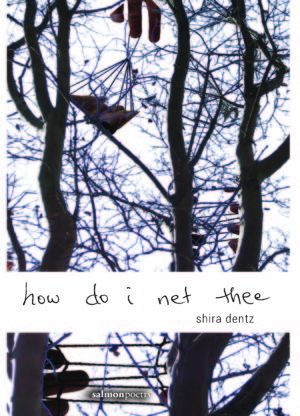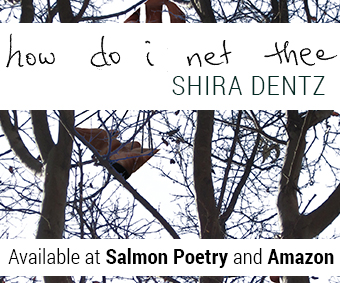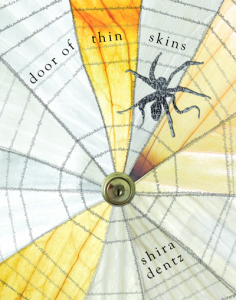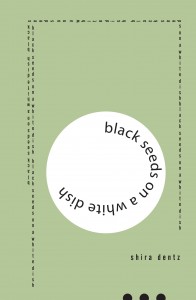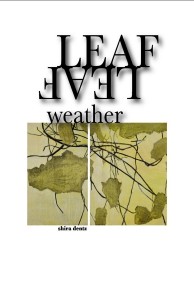SISYPHUSINA (second edition, Astrophil Press, 2025; first edition, PANK Books, 2020)
Winner of the Eugene Paul Nassar Poetry Prize 2021
Republished in Spring 2025 by Astrophil Press
with an intro by Jennifer Firestone, co-editor of Other Influences: An Untold History of Feminist Avant-garde Poetry (MIT Press, 2024)
Available for purchase now at Astrophil Press
Distributed by Asterism Books
SISYPHUSINA is a cross-genre collection of prose, poetry, visual art, and improvisatory music, centered on female aging. Faced with linguistic and literary traditions that lack rich vocabularies to describe female aging, Shira Dentz uses the hybrid form as an attempt to suture new language that reflects internal and physical processes that constitute a shifting identity. By deviating from formal classical construction, and using the recurring image of a rose, Sisyphusina circles around conventions of beauty, questioning traditional aesthetic values of continuity, coherence, and symmetry. Some of the book’s images are drawn from separate multimedia collaborations between the author and composer Pauline Oliveros, artist Kathy High, and artist Kathline Carr. A musical composition improvised by Pauline Oliveros, based on one of her text scores, titled “Aging Music,” is the book’s coda, and readers can listen to it online by scanning a QR code inside the book. The interweaving of these collaborations with the author’s voice and voices from other sources imbue this book with a porous texture, and reimagines the boundary of the book as a membrane.
Available now for purchase here at PANK Books, & here at SPD! Also available at Amazon & your local independent bookstore!
Poems and hybrid work in SISYPHUSINA previously appeared in venues including at The Academy of American Poets at Poets. org
Here’s a video-poem of “Saidst” that previously featured on PoetrySeen, that artist Kathy High and I collaborated in making and that’s part of SISYPHUSINA:
Musical composer Pauline’s Oliveros’ “Aging Music” can be accessed via a QR code at the end of the book! You can find more about Pauline Oliveos here
ASK THE AUTHOR: SHIRA DENTZ of SISYPHUSINA
A limited edition broadside of “Sisyphusina” (a poem) is available now at Reality Beach
°. ° ° °. ° °
ADVANCE PRAISE
With Sisyphusina, Shira Dentz tunes her eyes micro- and macroscopically to the fine details and patterns of animal behavior. Dentz is acutely aware of the animal that is a human body, in this case, a woman’s aging body, but also how the adaptive behaviors of earlier historical moments (such as the Egyptians dying even the hair of the dead) and of flounders and sharks converge into a mass of shared understanding about beauty and existence. This is a calmly anxious book, playful, confident, and exploratory in its textures and experiments with text and form. Virginia Woolf and Gertrude Stein are shades throughout these pages filled with shells, skin, and suits. We are reminded of the privilege of good vision, and it is a gift to behold the visual art, photographs, and drawings weaving throughout the book. Sisyphusina is a multi-media tour de force, an unforgettable one.
—Diana Khoi Nguyen
Sisyphusina is a gathering of the abundance and burden of gatherings, of remembrance, of the life that we are told to both carry and live. Shira Dentz examines the unravelings of age, the signs of having been in the world, and when these begin to show on the body. She writes that “belonging is form.” When one doesn’t belong, the world shifts, and its forms shatter. In stunning poetic displays of language, this collection illuminates this shattering, displays it in its very many brilliant, lapidarian, explosive, and heartbreaking forms.
—Jenny Boully
With language in play and at play, Sisyphusina exploits the resources of poetry to draw a wide canvas that embraces the quotidien, the sensuousness of nature and the fluidity of dream worlds, all interrupted and, at times, heightened by the visual. Dentz pays the ultimate respect to her readers in allowing them follow the skein of poetry, even as the borderlands between thought and expression are effaced, erased even. Slippery and evanescent, Sisyphusina is about how poetry allows us to founder and flounder through the certain uncertainty of life to transform the dross of the ordinary and the everyday into the marvellous.
—NourbeSe M. Philip
It happens to anyone who lives past youth; but contra such redundancy of aging, “beauty blossoms wisps” in Shira Dentz’s Sisyphusina. Utterly unpredictable and present to the potential in a next formal possibility, Dentz’s poems, images, and astute notations are appearances of generosity, feminist honesty, and wit.”
—Carla Harryman
Even if I weren’t caught up in the inspiring words of Shira Dentz, which I am, I would be swept along through her remarkable new book, Sisyphusina, by the shapes and textures of her verses, by the graphic surprises (and anticipation) from page to page, by her well-timed typographical idiosyncrasies, and by her perfectly calibrated spaces – around, below, above, and between the areas of text. I fell in love with the way “the very eye of night” shared two pages with a graph of dots which became snowflakes (asterisks) which became dots again, cued by her words and by a small perpendicularly arranged message: “thisiskin.”
—Kay Rosen
°. ° ° °. ° °
REVIEWS
“Fonts are often meant to be unobtrusive, invisible, so as not to distract from a text’s meaning. Dentz challenges this in much of her work by enhancing the text. Different sizes and bolding are used to emphasize some words over others. Text is interrupted by image, and one must read around and within images. Text is not an inert entity. It is a visible manifestation of thought. Text is embodied.” Read the entire review by Adrienne Dodt at ENTROPY Magazine here
°. ° ° °. ° °
“It’s what happens when a writer runs up against the limitations of language, and instead of conceding, she expands the form into something multidimensional, shoring it up with photographs and line drawings, scatter plots and photocopies, unorthodox punctuation and font sizes, music and video, literal layers of words angled over words. Sisyphusina uses form to describe experiences for which we don’t fully have words: What it means to have a body, especially an aging body, especially an aging female body.” Read the entire review by Alisha Jeddeloh at PromptPress here
°. ° ° °. ° °
In the introduction to Best American Experimental Writing 2016, Charles Bernstein and Tracie Morris assert that “The exploration of identities has always been at the center of radical and exploratory poetry. Indeed, you can define a difference between official verse culture and its opposites as one between work that assumes a fixed identity and work that forges new identity constructions. In this sense, identity is a space for exploration, invention, re-creation, and experimentation.” (2016) In Sisyphusina, Dentz has inhabited the space where identity thrives, and she has stayed there long enough to fashion authentic ideas from a unique perspective. She has opened up possibilities for text and intertexuality in relating what is it is like to be “swinging between age and youth, / … not ready to be encased like / an iridescent gray branch. Read the entire review by Anne Graue in GLASS: A Journal of Poetry here
°. ° ° °. ° °
Here’s are two excerpts from Frances Cannon’s visual review of SISYPHUSINA, “Profound Asymmetry” in POETRY NORTHWEST, and you can read the full hand-drawn review is here
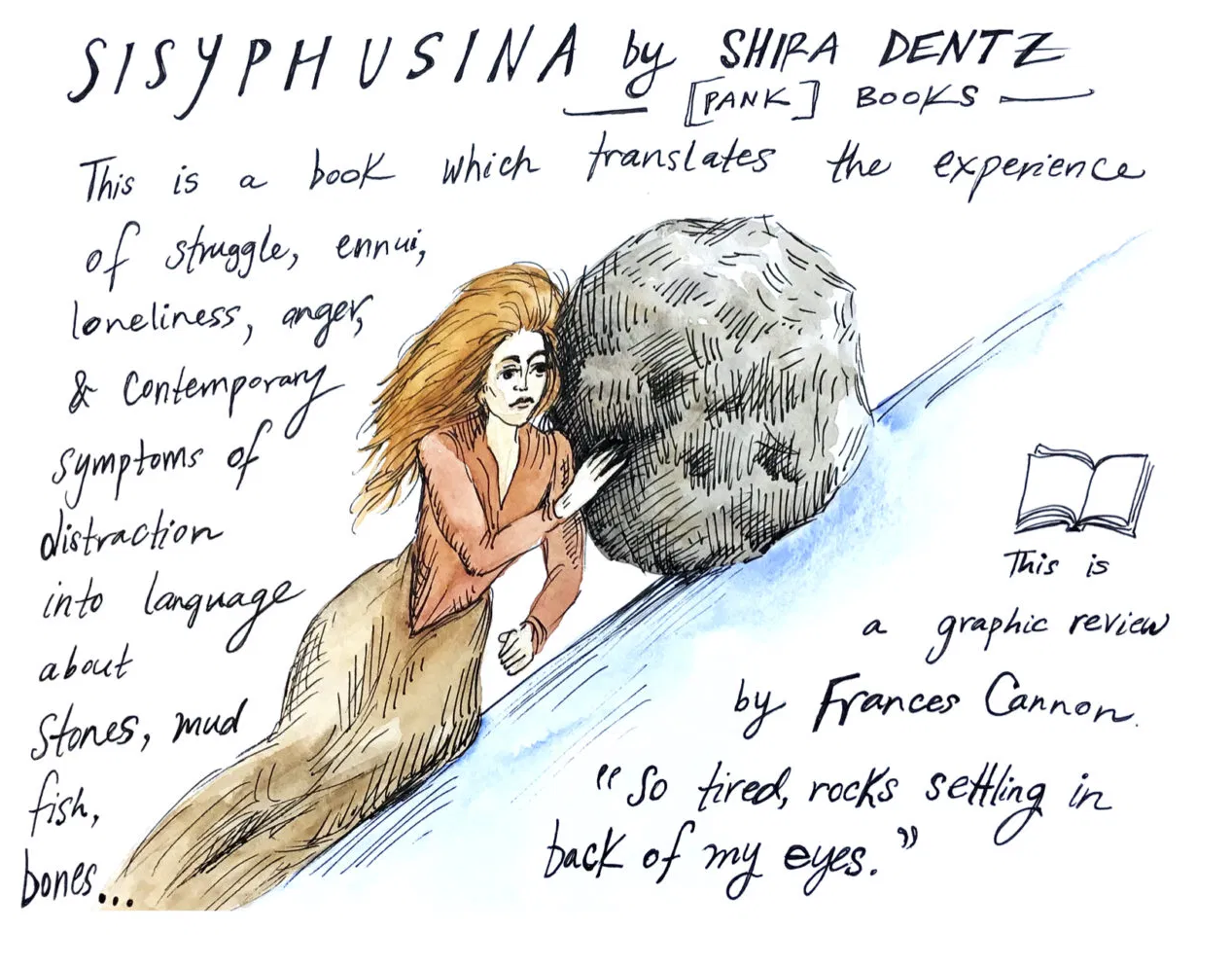
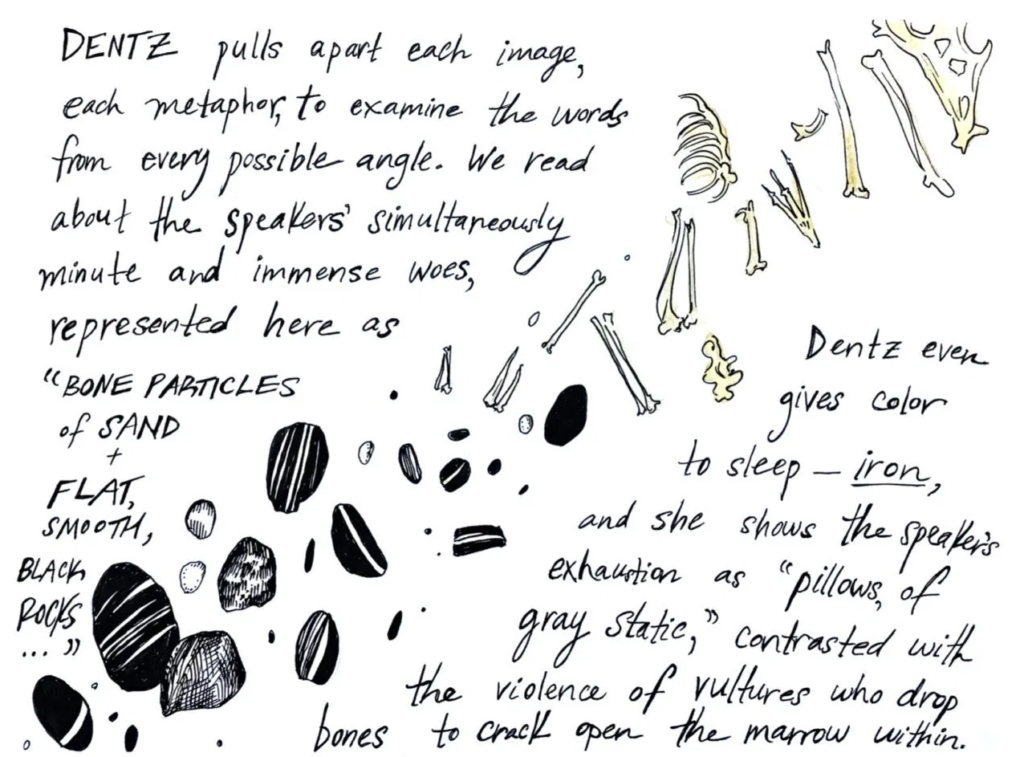
°. ° ° °. ° °
Read Rachel Abramowitz’s review, “To defy the gods: Form, Resilience, and Capaciousness in Shira Dentz’s SISYPHUSINA” in TUPELO QUARTERLY here
Here’s an excerpt:
“While of course mortal women age and eventually die, Sisyphusina presents a generational immortality which is no more bearable. And yet, it is Dentz’s fascinating experiments with form, image, subject, and typography that place her most in conversation with Albert Camus’ 1942 version of the myth, in which “The struggle itself towards the heights is enough to fill a man’s heart. One must imagine Sisyphus happy.” Camus’ figure outwits Zeus by assigning meaning to his otherwise meaningless task (and, after all, gains the immortality he so desires). Contemporary artists, it seems, exist somewhere between the two views of Sisyphus: embedded in their assignation of meaning is always failure—in the best art, failure is compelling and generative, rather than nihilistic. That’s great for Sisyphus (as it is for Camus), but Dentz’s collection begs the question: What does happiness—if it is at all possible—look like for Sisyphusina?”
°. ° ° °. ° °
Read Ruben Queseda’s interview with me about SISYPHUSINA in Poetry Today at KENYON REVIEW here
°. ° ° °. ° °
You can read Cody Stetzel’s full review of SISYPHUSINA in COLORADO REVIEW here. Here’s are two individual excerpts:
“Geometry is often known as a science of understanding, the discipline between shapes and sizes and the application of that information to everyday life. It makes sense to me that in a book so rife with understanding the self that the author chooses pictures, lineatures, shapes, and environments to decodify what had been blurred in turmoil.”
“In the end, Sisyphusina reminds me very much of the interpsychic demonstrations that Clarice Lispector offers, and the work brought me back to a quote from The Passion According to G.H.––“Give me your unknown hand, since life is hurting me, and I don’t know how to speak—.” That in all of its work is both the known and unknown hand, yearning for some form of assistance in creating the picture. Lispector would very much create a character whose realness startled her, and in this way I found Dentz’s written moments like in “Flounders,”
I seem to not want to explore my feeling now that she was
almost burning to the next room tearing up those papers.
to yield a refreshing innovation, almost burning, yielding nothing to the confining limitations of tradition, expectation, and a poetic world.”
°. ° ° °. ° °
You can read “Shira Dentz on Sisyphusina” at Poetry Society of America HERE.
°. ° ° °. ° °
You can read Michael Peverett ‘s close reading of “Penmanship,” a poem in my book how do i net thee (Salmon Poetry) at Intercapillary Space (based in the UK) and placing it within the context of my other books, including SISYPHUSINA HERE.
Here’s an excerpt from Peverett’s review: Shira Dentz is an author who willingly courts the term “hybrid”. She began as a graphic designer working in the music industry, and you can see that background in the remarkable care given to the presentation of how do i net thee; its jacket, title page, the intricate typesetting and visual layouts. Some of her other books, such as door of thin skins (2013, about psychological abuse) and Sisyphusina (2020, about women’s aging and beauty) intermix a lot of documentary and fictional prose. These books admit content in a way that much experimental poetry doesn’t; in other words, the kind of content we’re inclined to call “straightforward”, though the books themselves show how “straightforward” isn’t an adequate description.
°. ° ° °. ° °
Hayden Bergman’s review “Sanctioned Poetries: A Review of Shira Dentz’s Sisyphusina” at TUPELO QUARTERLY can be read in full here. Here’s an excerpt:
A book that moves in ways that most books don’t (or won’t) attempt… At its center, Sisyphusina is concerned with change—in particular, the changes undergone by a woman. This speaker endures shifting family dynamics, and the changes to her own body as she ages. She also faces criticism for not changing in ways expected of her, for not aligning herself with what Welter would call the ‘Cult of True Womanhood’.”
°. ° ° °. ° °
°. ° ° °. ° °
Jessica Goodfellow reviews Sisyphusina at Barrelhouse. Here’s an excerpt:
On top of dizzyingly original arrangements of words and forms, this collection offers artistic and musical collaborations, which are better experienced than described. Either a QR code at the end of the book or an online link will take you to the sound performance “Aging Music,” performed by Pauline Oliveras, which was co-imagined with Dentz’s Sisyphusina. Additionally, a poem-film based on Dentz’s “saidst,” jointly made with Kathy High, is available online. With so many modalities for the witnessing the exploration on women’s aging, Dentz has more than done her part to record this complicated experience, available vocabulary notwithstanding, for the future canon.
_______________________________________________
the sun a blazing zero (Lavender Ink/Diálogos), March 2019
Distributed through Asterism
the sun a blazing zero tracks the vibrations of a receding world that hasn’t yet entirely vanished. Its language-map moves towards intensifying a lyric field to articulate experiences that lack vocabulary, and to ride with/not rebut the noise of information-overload in contemporary psyches. A feminist assemblage, the sun a blazing zero weaves the personal and sociopolitical through shifting shutter speeds.
Available for order at Lavender Ink/Diålogos, Amazon, & other sites, & distributed by SPD. Available also at select bookstores!
THE SUN A BLAZING ZERO was an SPD Handpick in May 2019.
Read Entropy‘s “Small Press Releases” column
Read Kelly Lydick’s interview with me in Rain Taxi Review of Books
°. ° ° °. ° °
“Welcoming the / crackling from one snap of think,” Shira Dentz’s latest collection, the sun a blazing zero, leaps synaptically (and syntactically) from sensation to affect, from self to cosmos, and from heartbreak to wonder. Under a literary constellation composed of William Blake, Henry David Thoreau, Vito Acconci, and Susan Howe, this poet invites us to join her in “building a house open to the elements.” The views from this exposed literary shelter are simply breathtaking. You can watch “mountains / like flame, / only slower.” Those unaccustomed to the cold at such altitudes are invited to wrap themselves in “mourning, the heaviest fabric.” Dentz shows us how to dwell in worlds far from home.
—Srikanth Chicu Reddy
These fine-grained, loose-limbed poems stay lightly with the contact zone where senses meet day. The zone precipitates scenes and memories, hi-def images, half-words. Notation coalesces into sensate palmate structures, affective fractals, till moments wheel like murmurations. Blazing Zero is gestural, avid, and moving, multi-ways.
—Catherine Wagner
“Encompassing our past and present in a flirtatious and exuberant display of lyric immediacy, Dentz stretches our textural engagement with memory and history – feminism, the Holocaust, gardens and animals with texts that read like improvisatory jazz fugues. A pleasure to read and to look at.”
—Erica Baum
If Emily Dickinson wants to “Tell all the truth but tell it slant,” Shira Dentz wants “the lines to open. to be jagged, smeared, and tilted.” That wish, expressed late in Dentz’s new book, does not substitute for the deed, but describes the deed performed by the poetry that precedes it. the sun a blazing zero is full of jagged, smeared, and tilted lines, of poems “open to the elements.”
—H. L. Hix
In these poems, we find “a glint like an eye’s: yolk yellow, crayon thick,” a sonic “hue do” where senses intertwine and words lead one into the next breathlessly opening and opening again. Dentz’s poems leave spaces agape, even in their sonic onrush, to allow for “a question mark, which is by its space to be slept wafting.” Her porous poetics blankets the small and uncertain self in rich language that makes us more comfortable with loss, death, cold, and the unknown—those “blazing zeroes” where uncertainty becomes palpable.
—Amaranth Borsuk
°. ° ° °. ° °
In James Knippen’s shout-out about a few of the best books of poetry he’s read this year, he writes:
the sun a blazing zero by Shira Dentz: I am a sucker for poems that eschew traditional syntax for purposes of rhythmicality and general weirdness. But too often such poems, entertaining as they are, feel more gimmicky than authentic—the strangeness being the point rather than the strangeness serving the point. Dentz’s poems, though, are personal and feel wholly authentic—less Ron Silliman (strangeness constructed) and more Alfred Starr Hamilton or Michael Burkard (strangeness inherent). Their syntactical and tonal variety, and rhythmicality, work toward elucidating heartbreak and trauma rather than obscuring it. And what self-respecting poet wouldn’t succumb to language like this: “i want tomatoes rocks a whole story happened/flying across water a leaf falls birdacross/the sound sparrow tight welcoming//saw words the element sparrow of wind. it mat i like wate. breast botta moving./procks alone”?
__________________________________________________________
how do i net thee (Salmon Poetry) April 2018
To purchase: please email me at shirad@earthlink. net to purchase via Venmo or PayPal
A finalist for the National Poetry Series and APR’s Honickman Award, how do I net thee is a diagram of a voice drawn through lyric, visual, and prose poems threading schisms—within a family, within a society brutalized by racial tensions, and within the space crossed in the transition from fertility to its loss.
Language whips around wildly but wisely in Shira Dentz’s latest superb collection. Seamlessly blending the vernacular with the erudite, she echoes her dynamic phrasings with dynamic typography, and yet what accrues, above all, throughout the book is a sense of her profound engagement with the world. The book is aloft by principle, and alive with it.
—Cole Swensen
how do i net thee asks Shira Dentz in her brilliant new book. Cast across the turbulent sea of language, these poems bring back to us a medley of phrases, voices that capture an ecstatic, coruscating world of trauma, loss & retrieval. Here is “the Book of Anger in the shape of a dog”; a vagina with “three white waterfalls”; “the heel of an echo” that soars “on falcon wings.” Following in the footsteps of her great precursors, Virginia Woolf, Gertrude Stein, Adrienne Rich, Dentz’s luminous poems reveal to us “a woman’s secret language” from “a mouth inside herself.” Read them!
—L. S. Asekoff
You can buy how do i net thee at Amazon U.S., Amazon U.K., Salmon Poetry, and selected bookstores.
The U.S. Distributor is Dufour Editions (contact: Duncan May), and bookstores and libraries can also order through Ingram and Yankee Book Peddler.
************************************************
“It asks “in the dark are there kind letters and if so which are they” (58). It delights with intellectual twisty-turns, yes, and strange methodologies, but it does so with an ethical, human anchor and purpose, with a beating heart, and in doing so, it turns me into something more than a passive subject. It take catch capture gathers me up and actually moves me, which is what I would ultimately say to describe how do i net thee: it moves me smartly, it transports me, intercepts, arrests, apprehends, gains possession of me, entangles, affects violently, seizes, snatches, grasps, lays hold of, grips, snags, hooks, it captivates. And good.” Read the entire review by Kathryn Cowles in YES POETRY here
************************************************
how do I net thee is illuminating and at every turn exponential in aspect. The book answers the very question it poses in the title with the only answer befitting the works inside, by answering in as many ways that are possible and by never positing the answer. how do i net thee is a work of monumental significance, an important articulation of the untranslatable. It is measurable by all that it is not, in that it should be measured by the lineage of collections that came before and as a standard of measure for collections that will come forever after.” Read the entire review by Ralph Pennel in THE IOWA REVIEW here
************************************************
“Shira Dentz’s how do I net thee reveals language as a grid. Its verdant poems effortlessly sprawl out across the page as they yearn to capture and document loss, memory, and grief in the face of uncertainty… She creates vivid snapshots into a living history that still feels so present, prescient, and pressing.” Read the entire review by Julia Masden in FULL STOP here
************************************************
“a paradoxical collection, in that narrative is abstract, but the language is incredibly precise…In the tender nets of Dentz’s poems, which are, at turns, brutal and delicate microcosms of the lived experience, the world undoes us, daily, then reminds us of our capacity for vision.” Read the entire review by Hanna Andrews in OMNIVERSE here
************************************************
“Shira Dentz’s third, color-studded book, how do i net thee, invites an interactive, immersive reading experience. Dentz’s iridescent language might best be described as Play-Doh, constructed to be flexible, moveable, and often flung—though unlike Play-Doh, these poems are often weightier and sticky. Mostly resisting paraphrase and defying narrative explanation, Dentz’s lines instead sprawl and twist associatively across the neural net of the poet’s consciousness…this is a style that feels like Dentz’s alone.” Read the entire review in THE ADROIT JOURNAL here
************************************************
“The Best of the Best of “: HEAVY FEATHER REVIEW Editors in 2018
************************************************
“To be tolerant of uncertainty is to be available to the next experience, rather like Dentz, and this seems an important feature for a writer…[Dentz] is more concerned with showing how strange it is that this language-thing might be played to show the on-going spectacle of being.” Read Martin Corless-Smith’s entire review in DIAGRAM here
************************************************
“Immediately we are snared by a number of entangling forces: illustration, mathematics, objects sentient and non-, and a hazy delineation between predator and prey. This collection is at once an “arrangement of lines” as all poems are, and a constant negotiation between the protection and confinement those arrangements offer, between holding living things and providing the parameters necessary for freedom…Fittingly, Dent is a master of visual form…These are difficult, tactile, dangerous poems, and yet, in the end, it is the beauty that nets thee.” Reviewed by Rachel Abramowitz in the Fall 2018 print issue of SENECA REVIEW
************************************************
“It is within this complex and double-edged sense of the grid, or the net, that Shira Dentz’s how do i net thee works, as she threads together the messy and necessarily imperfect familial ties that serve as a throughline throughout the book, while at the same time composing poems that are deeply skeptical of the nets she casts—or is caught up within…Not quite a closed text, hermetically sealed, and not quite an open text, freely given, how do i net thee straddles the seeming divide between these two camps of poetry, offering poems that must be actively composed by the reader through a navigation of the visual and syntactical grids Dentz constructs, but with a lyric throughline threading the poems and sections together.” Read Travis Sharp’s full review at ENTROPY here
************************************************
“A record of the need to constantly revise one’s account of the world… The page seems to have no center; the spine toggles between being a y and x axis. We manipulate the book like a bubble level, waiting for the poem to settle…By the end of it we have moved through such wide territory, from grief to parenthood to autumnal beauty to the cost of cherries, that we are aware there is no way to contain multitudes except to cast multifaceted forms. Language may be the best net for this we have, even though we know most of life will slip right through.” Read Andrew Seguin’s full review at THE COLORADO REVIEW here.
************************************************
“The work drips with moments that leave more than dirt around the fingers… drops the reader into a space that simmers with horror and enchantment.” Read Bill Lessard’s full review at THE BROOKLYN RAIL here
************************************************
“The force of imagination in Shira Dentz’s ‘how do i net thee’ is complex, bewildering, and polyphonic. Scaling and traversing its sensory-rich, charged space, the poems leap imaginatively across space and time…The poems in ‘how do i net thee’ are fully netted here. May readers not let them escape.”–from Cheryl Clark Vermeulen’s review in Interim Magazine (Print Issue 35.5)
_______________________________________________________
FLOUNDERS (Essay Press, 2016) Free & downloadable!
Classical beauty depends on symmetry, and our love for symmetry is organic and essential to our survival as individuals and as a species, reproductively (signaling health in a mate) and otherwise. In this work, I engage with notions of form and beauty that I, as an artist and a social being, have inherited and tacitly acknowledge or actively work against. Now, to return full circle to consistency, I leave off with another excerpt, but from an earlier work—
“Nothing to do but let the form of things take over.”
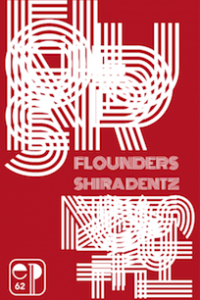
AN EXCERPT FROM EP 62
“Just sitting on my wrist feeling stupid feeling blue the sky white across a band of sunlight no gauze the trees making v’s with their arms ~ want to look at the paper now. there’ll be a story about egypt. the people are free but the media blitz makes it controlled. free, controlled. when the snow clears i can see cars on roads didn’t know existed. keep eating clementines. they’re so tiny and tasty. the tree shaves against the window. clouds white hair.”
Read Koh Xin Tian’s interview with me about FLOUNDERS at Plougshares‘ blog here
Reviewed by Cody Stetzel in Glass: A Journal of Poetry
__________________________________________________________
door of thin skins (CavanKerry Press, 2013)
A hybrid of poetry, prose, and visual elements, door of thin skins is a tale that unfolds in a psychotherapist’s and a state prosecutor’s office and the mind of the poet regarding it all–
door of thin skins deconstructs the nature of psychological power through a reconstruction akin to a psychological diorama. The book’s events, narrated by a young woman in psychotherapy, unfold in non-chronological sequence, and recurring phrases, images, and events unify and deepen the narrative whose formal construction mirrors the process of psychotherapy. As a patient-therapist relationship becomes dependent and sexual, resulting in a precarious blurring of boundaries, the text alternates between the straightforward and syntactically disjunctive. Visual poems contribute another layer towards enacting one of the book’s themes, a fracturing of the narrator’s sight and simultaneous and conflicting perceptions of reality. The book’s formal experimentation echoes and challenges Wittgenstein’s ”the limits of my language mean the limits of my world.” In addition to its innovative poetics, this book’s voice, first published in 2013, is among the voices precursory to the #MeToo movement.
door of thin skins is a perfect title for Shira Dentz’ latest work. In this fever dream of a book, Dentz’s language is like a spirit who can pass through the scrims of time and perspective, but not unscathed. These poems are the toll. She sings what fails to kill us. —Cornelius Eady
door of thin skins tracks the misuse of power in a patient/doctor relationship in shattering detail. A patient is cut off from her body and the doctor imposes his. Her senses have dispersed as if to escape the troubled site. In these poems, the experiences that tear the mind and the mind’s language must be recollected in language, which becomes a reenactment of the wounding. What the poet must do, and does, is let language be torn apart so that the senses (sense) may re-collect in beauty, in the body of the poem.
—Eleni Sikelianos
Here is David as a 21-year-old confused girl in boyish clothes and Goliath as a golden-credentialed 60-year-old psychotherapist in orthopedic shoes who jeopardizes his career when he sexually crosses the line with his young patient, then continually questions the reality of her perceptions. Shira Dentz’s brilliant poetic amalgam of circumstance and the mind’s second-guessing, door of thin skins presents a contemporary David and Goliath tale that unfolds in a psychotherapist’s office, a state prosecutor’s office, and the crystalline mind of the poet regarding it all. Poetry itself becomes the slingshot in this face-off. The poet’s clever innovation of an edgy and oddball brand of avant-garde song-and-response tells this tale through a mix of thought, feeling, fact, history, and personal history and a riveting pastiche of rhythmical poetry, visual poetry and prose poetry. Dentz triumphs in her dazzling and fractured narrative; door of thin skins startles and astounds.
—Molly Peacock
Shira Dentz’s door of thin skins is not only an intimate narrative of seduction and abuse, but a tour de force of assemblage. Each gallery-worthy page is meticulously arranged, prose overlain with lyric sequences, visual space with visual density. From every angle, door of thin skins is a chilling and exquisite document.
—Karen Brennan
DOOR OF THIN SKINS was short-listed for Utah’s 13 Bytes Magazine Book Award
You can buy the book at Amazon here
Or buy it at from the publisher, CavanKerry Press
The book’s distributor is Chicago Distribution Center
Read an interview with me about the book by Nin Andrews here
Read an interview with me about the book by Pepper Luboff on OmniVerse at Omnidawn Publishing here
Eileen Tabios, the editor of Galatea Resurrects, blogs about door of thin skins here
Read a review at NewPages here
Read a review by Brenda Sieczkowski in Tarpaulin Sky here
Read a review by Sandy Florian in HTML Giant here
Read a review by Kay Cosgrove in Green Mountain Review here
Read a review by Nicole Sheets in Diagram New Michigan Press here
Read a review by Jane L. Carman in American Book Review, Sex Writing, edited by Cris Mazza here
Read a review by Ann Fisher-Wirth in Rattle here
Read a review by Nicole Walker in The Rumpus here
Reviewed by Megan Burns in Rain Taxi
In Jill Magi’s imagined interdisciplinary course on violence and nonviolence
Reviewed by Eileen Tabios in Galatea Resurrects
Reviewed by Sima Rabinowitz in Galatea Resurrects
Reviewed by Michael McLane in Cutbank
Reviewed by Danielle Cadenza Deulen in Georgia Review
Reviewed by Aviya Kushner in Salamander
Reviewed in Chronogram‘s annual poetry roundup in its June 2014 issue here
Reviewed by Kristina Marie Darling in American Literary Review
Reviewed by Marthe Reed in Denver Quarterly
Reviewed by Kathline Carr in Grab the Lapels
Reviewed by Holly Welker in Fourth Genre, Spring 2016
Reviewed by Zoran Rosko at his blog
door of thin skins is also available for purchase at bookstores including:
Prairie Lights Bookstore, Iowa City, IA
Harvard Bookstore, Boston, MA
Grolier Poetry Bookshop, Boston, MA
King’s English Bookstore, Salt Lake City, UT
Northshire Bookstore, Saratoga Springs, NY
Market Block Bookstore, Troy, NY
Watch a book trailer for door of thin skins here
__________________________________________________________
black seeds on a white dish (Shearsman Books), 2010
black seeds on a white dish was a finalist for the Academy of American Poets’ Walt Whitman Award, nominated for the PEN/Joyce Osterweil Award 2011 from PEN’s American Center, and featured in Poets & Writers’ sixth annual feature on debut poetry books.
The poems in black seeds on a white dish spring from the search for what is generated and discovered when loss and desire occupy the same space. But lamentation is not the primary focus—by destabilizing everything in its reach, loss disables rigidity. These poems shift widely in form and tone, and seeds invoke the creative germ that spurs the metamorphoses occupying them: “Nothing to do but let the form of things take over.” Shapes themselves, including punctuation, become a language throughout.
“Paul Cézanne once quietly avowed ‘I will astonish Paris with an apple.’ And now I may, with quite an equal confidence, announce that Shira Dentz will astonish us all with the ‘the curve of a melon,’ ‘a sunray diagonal’ and ‘pumpkin seeds.’ Which is to say that here is a book to unstill all the still life images resting in our hearts. Shira Dentz is the most powerfully delicate poet I know.”
—Donald Revell
Perhaps it is as a word-salad that ‘A Thin Green Line’ actually makes itself known, but if a word-salad, this poem gathers all greens… There is then, an immediate sense thatlanguage is a collection, a miscellany informed with a pungent historicity of specific culture and rendered palpable in voice and ear. Words, the material stuff of poetry, are made more vividly present through this residuum of green. Radical without delving into the philologicalroots of words, ‘A Thin Green Line’ non1etheless gives descriptive language a privileged place inthe literature that is lyrical prose-poetry.”
—Marjorie Welish, from her judge’s comments for PSA’s Cecil Hemley Memorial Award
“In Shira Dentz’s poems, memory dissolves into language, dissolves again into feeling, and finally into revelation. Yet she is never lost. How does she keep her bearing? From mourning through laughter, wit and an elegant economy of style guide her way. The result is a synesthetic experience, where colorsmorph into music and sound sculpts itself into shapes: ‘…your voice has always been a fragment /organized as a flower…’”
—Elaine Equi
“What does it mean ‘to let the form of things take over’? Shira Dentz is a poet of thrilling disorientationsand courageous surrenders, a creature for whom the very letters of the alphabet are seeds of wonder, seeds of grief. Against all that is hollow, bland, and bare, she composes and exposes lush landscapesof sound and sight—punctuated by jagged flashes of irony, quirky comedy, and heartbreakinginsight. I relish these poems, and celebrate the appearance of a collection that offers so much thatis rare, artful, tender, urgent, unexpected, and true. And I am enthralled by a mind that gives voiceto so many forms of desire in lines so freely expressing the shapes of our humanity: ‘I want to say my life has / been a pipecleaner, beautifully twisted, / in tandem with others like it.’”
—Phillis Levin
More information and to buy the book at Shearsman Books
Or you can buy the book at Amazon
Reviews:
Read an interview with me about the book with Stacy Kidd at The Rumpus here.
Read a review by John Bloomberg-Rissman in Galatea Resurrects (May 10, 2012)
Reviewed by Celia Bland in Boston Review (Nov./Dec. 2011)
Read a review by Valerie Wetlaufer at Drunken Boat here
Read a review by Ann van Buren at The Rumpus here
Read a review by Cindy Hochman at Coldfront here
Reviewed by Holly Welker in The Colorado Review (Fall 2011)
Reviewed by Kristina Marie Darling in Pleiades (Summer 2011)
Read a poem excerpted from the book at Poetry Daily here
Read a poem excerpted from the book at Verse Daily here
Read a review by Erin Bertram at Rain Taxi here
Read a review by Jenny Gropp Hess at Tarpaulin Sky here
Read a review by Joseph P. Wood at Gently Read Literature here
Read a review by Sima Rabinowitz at New Pages here
From John Keene here
__________________________________________________________
Leaf Weather (Tilt Press, 2009 and reissued in 2nd edition by Shearsman Books, April 2012)
Imagine desire as a boscage, heady with its scents, untamed, infinite in its ability to sex and seed. This is the terrain Shira Dentz paints in her passionate Leaf Weather, a luminous canvas upon which each variation of color, each nuanced line, brings us ever closer to the garden of earthly delights. Like Emerson, Dentz pays homage to the sacred wood wherein songs are “always new, like time itself, or like love.”
—D. A. Powell
Veering–often within a single poem, often within a single line–from self lacerating anger to desperation, from mordant satire of the confessional mode to stunned (and stunning) autobiography, from irreverence to a state of fearful silence, Leaf Weather is a “chapbook” in no diminutive sense of the term. In “peeling/away the sun,” Shira Dentz unlooses equal parts verbal anxiety, formal adventure, and emotional reckoning. It’s one thing to write poems; it’s
quite another to live, as Dentz does, in the marrow of one’s words.
—Mark Levine
What I admire most about Shira Dentz’s poetry is the sometimes wacky, sometimes heart-wrenching precision of her descriptions: “my bubby is a black pump,” for example, or “the sky tinfoil” or “fog / a close cousin to the spider web.” Always at work is a surprising fusion of self-deprecating humor with vulnerable, self-revealing yearning — “want to make/ suction cups out of the bluegreenyellow air” — and a revelatory insight into the quirky essences of people and things.
—Jacqueline Osherow
Reviews:
Review by Valerie Wetlaufer at Tarpaulin Sky
Review by Noah Eli Gordon at Rain Taxi
Review by Kirsten Jorgensen at Diagram
Buy chapbook at Amazon, Barnes & Noble, & Shearsman Books



